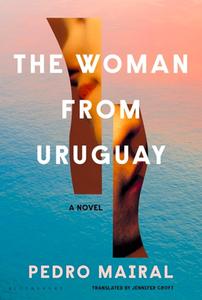
 Pedro Mairal's The Woman from Uruguay follows a contemporary Argentine writer named Lucas for a single fateful Tuesday, as he travels from Buenos Aires to Montevideo and back again. Lucas narrates these events, with flashes forward and back in time, in a lengthy direct address to his wife, Catalina. "You told me I talked in my sleep. That's the first thing I remember." He is stumbling, if not entirely failing, as a writer, in debt to nearly everyone he knows, and fairly sure that Catalina is cheating on him. The purpose of the day trip to Uruguay is ostensibly to collect a significant sum of money in cash (advances on two books), which Lucas expects will change his fortunes. His hidden, secondary purpose is to visit the titular woman with whom Lucas has been captivated since they met at a writers' festival months earlier. He calls her Guerra--war--and is obsessed by their so-far-unconsummated affair.
Pedro Mairal's The Woman from Uruguay follows a contemporary Argentine writer named Lucas for a single fateful Tuesday, as he travels from Buenos Aires to Montevideo and back again. Lucas narrates these events, with flashes forward and back in time, in a lengthy direct address to his wife, Catalina. "You told me I talked in my sleep. That's the first thing I remember." He is stumbling, if not entirely failing, as a writer, in debt to nearly everyone he knows, and fairly sure that Catalina is cheating on him. The purpose of the day trip to Uruguay is ostensibly to collect a significant sum of money in cash (advances on two books), which Lucas expects will change his fortunes. His hidden, secondary purpose is to visit the titular woman with whom Lucas has been captivated since they met at a writers' festival months earlier. He calls her Guerra--war--and is obsessed by their so-far-unconsummated affair.
Lucas is not an entirely likable narrator. He is self-pitying, a bit sleazy in his adulterous aspirations and at best a mediocre husband and father. He resents his wife for her ability to support him financially, and his young son for disrupting his work ("How am I supposed to write with my kid dangling from my balls?"). But readers will be drawn in by the mysterious Guerra and the pathetic and darkly comic narrative of Lucas's unlucky day. He can be woefully misguided by desire (for Guerra, for escape from responsibility), artful in his telling (Lucas is a writer, after all), wry, clever and even wise. In buying a ukulele for his son: "I realized I'd rather play the ukulele well than keep playing the guitar poorly, and that was like a new personal philosophy. If you can't handle life, try a lifelet." The translation from Spanish to English by Jennifer Croft (Homesick) handles such moods and idiosyncrasies perfectly. Lucas's child is a "tiny little elderly man, that haiku of a person," "a drunken dwarf." Readers may not be precisely rooting for Lucas to get what he wants (which is a bit unclear even to Lucas), but they will certainly be eager to find out what happens next.
In just 17 hours, this luckless protagonist experiences great hopes and severe losses, navigating both a marital crisis and an existential one with limited grace but great ardor and intensity. Challenged in love, marriage, parenthood, finances and fantasy, he makes a mess but comes away with a story to tell and, for a writer, there are worse endings. "May death be to know all," he muses in hindsight. "For now, I can only imagine." --Julia Kastner, librarian and blogger at pagesofjulia
Shelf Talker: Part picaresque, part tragedy, this critical day in the life of a hapless Argentine writer and would-be lover is both entertaining and thought-provoking.

